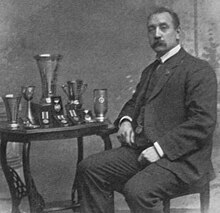 | ||||||||||||||||||||||||
| Personal information | ||||||||||||||||||||||||
|---|---|---|---|---|---|---|---|---|---|---|---|---|---|---|---|---|---|---|---|---|---|---|---|---|
| Full name | William Henry | |||||||||||||||||||||||
| National team | Great Britain | |||||||||||||||||||||||
| Born | 28 June 1859 St Pancras, London, England | |||||||||||||||||||||||
| Died | 20 March 1928 (aged 68) St Pancras, London, England | |||||||||||||||||||||||
| Sport | ||||||||||||||||||||||||
| Sport | Swimming | |||||||||||||||||||||||
| Strokes | Freestyle, water polo | |||||||||||||||||||||||
| Club | London Leander SC | |||||||||||||||||||||||
Medal record
| ||||||||||||||||||||||||
William Henry (28 June 1859 – 20 March 1928), born Joseph Nawrocki, was an English competitive swimmer and lifesaver who represented Great Britain in international competition.[1][2]

Biography
[edit]He was of Polish ancestry, and changed his original Polish surname Nawrocki to the English "Henry". He was a co-founder of the Royal Life Saving Society. As a swimmer he won a number of national and European championships. In 1906, at 46, he became the oldest ever Olympic medal winner in swimming as a member of the British men's 4×250-metre relay team which won the bronze medal. He won a gold medal in the 1900 Summer Olympics for Water Polo.[1]
Henry is an International Swimming Hall of Fame inductee. He was the swimming instructor for the British royal family, using the swimming pool at the Bath Club, Dover Street.[1] He helped to formalise the rules of water polo.[3] With Archibald Sinclair (1866–1922), he wrote a book on swimming for the Badminton Library.[4][5]
Death
[edit]He died in the St Pancras district of London, aged 68.[6] He was buried with his wife Elizabeth at Highgate Cemetery, with a memorial above the grave paid for by members and friends of the Royal Life Saving Society.
See also
[edit]- Great Britain men's Olympic water polo team records and statistics
- List of Olympic medalists in swimming (men)
- List of Olympic medalists in water polo (men)
- List of Olympic champions in men's water polo
- List of men's Olympic water polo tournament goalkeepers
- List of members of the International Swimming Hall of Fame
References
[edit]- ^ a b c "Our founder, William Henry". Commonwealth Drowning Prevention. Archived from the original on 18 October 2016. Retrieved 14 October 2016.
- ^ "William Henry". Olympedia. Retrieved 31 December 2020.
- ^ Henry, William (2013). Water Polo: A Brief History, Rules of the Game and Instructions on How to Play. Read Books Ltd. ISBN 9781446548608.
- ^ Sinclair, Archibald; Henry, William (1916). Swimming. The Badminton library of sports and pastimes. London: Longmans, Green & Co; 1st edition 1893; 4th edition 1903
{{cite book}}: CS1 maint: postscript (link) - ^ Watkins, M. G. (5 August 1893). "Review of Swimming by A. Sinclair and W. Henry". The Academy. 44 (1109): 105–106.
- ^ England & Wales, FreeBMD Death Index: William Henry; Jan-Feb-Mar quarter 1928; Age: 67; District: Pancras; Volume: 1b; Page: 79.
External links
[edit]- William Henry at the International Swimming Hall of Fame
- William Henry at Olympics.com
- William Henry at Team GB
- William Henry at Olympedia